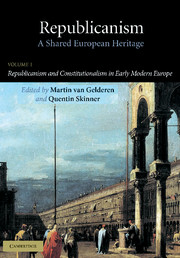Book contents
- Frontmatter
- Contents of Volume I
- Contents of Volume II
- Acknowledgments
- Introduction
- Part I The Rejection of Monarchy
- Part II The Republican Citizen
- Part III The Republican Constitution
- 9 From the Crisis of Civil Culture to the Neapolitan Republic of 1647: Republicanism in Italy between the Sixteenth and Seventeenth Centuries
- 10 Aristotelians, Monarchomachs and Republicans: Sovereignty and respublica mixta in Dutch and German Political Thought, 1580–1650
- 11 Debating the respublica mixta: German and Dutch Political Discourses around 1700
- 12 Classical Foundational Myths of European Republicanism: The Jewish Commonwealth
- 13 Republican Politics in Early Modern Spain: The Castilian and Catalano-Aragonese Traditions
- 14 The Idea of a Republican Constitution in Old Régime France
- 15 Republicanism, Regicide and Republic: The English Experience
- Bibliography
- Contributors
- Index of Names of Persons
- Index of Subjects
10 - Aristotelians, Monarchomachs and Republicans: Sovereignty and respublica mixta in Dutch and German Political Thought, 1580–1650
Published online by Cambridge University Press: 15 December 2009
- Frontmatter
- Contents of Volume I
- Contents of Volume II
- Acknowledgments
- Introduction
- Part I The Rejection of Monarchy
- Part II The Republican Citizen
- Part III The Republican Constitution
- 9 From the Crisis of Civil Culture to the Neapolitan Republic of 1647: Republicanism in Italy between the Sixteenth and Seventeenth Centuries
- 10 Aristotelians, Monarchomachs and Republicans: Sovereignty and respublica mixta in Dutch and German Political Thought, 1580–1650
- 11 Debating the respublica mixta: German and Dutch Political Discourses around 1700
- 12 Classical Foundational Myths of European Republicanism: The Jewish Commonwealth
- 13 Republican Politics in Early Modern Spain: The Castilian and Catalano-Aragonese Traditions
- 14 The Idea of a Republican Constitution in Old Régime France
- 15 Republicanism, Regicide and Republic: The English Experience
- Bibliography
- Contributors
- Index of Names of Persons
- Index of Subjects
Summary
Introduction
In the Ragguagli di Parnaso, published in 1612, the Italian satirist Traiano Boccalini pointed out that the obstinate rebellion against the Spanish wolves had led to the introduction of ‘the form of the republics of Germany … amongst the Dutch’ (Boccalini 1948, cent. III, rag. 4 (vol. III, p. 18). Writing in the same year, another Italian commentator, cardinal Guido Bentivoglio, argued that in becoming ‘republiche libere’ the Dutch provinces had accomplished a radical change from monarchy to mixed republic: ‘From a government, which was principally a monarchy, the United Provinces have turned to a government which is partly an Aristocracy and partly a Democracy’ (Bentivoglio 1983: 10).
Bentivoglio's and Boccalini's comments were the beginning of a series of Italian commentaries which took the new Dutch republic as the model for political innovation. All across Europe jurists and politici saw Holland and the other United Provinces as a new respublica mixta, whose institutions and constitutions should be compared with those of the imperial and autonomous cities of the old German Empire, ‘the republics of Germany’ as Boccalini put it.
Seventeenth-century admiration for the Dutch and German republics is not reflected in modern historiography. Dutch and German political thought of the first half of the seventeenth century is not usually connected with the history of republicanism.
- Type
- Chapter
- Information
- RepublicanismA Shared European Heritage, pp. 195 - 218Publisher: Cambridge University PressPrint publication year: 2002
- 7
- Cited by

